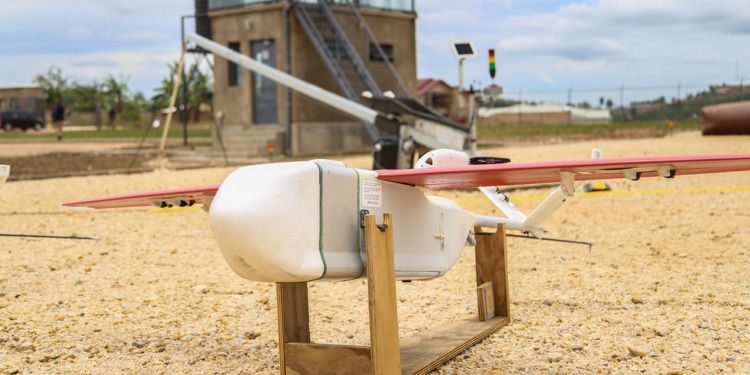In December 2022, the Government of Rwanda announced that they would be commencing an official partnership with Zipline. For six years, the company has operated all across the country, helping to deliver life-saving blood and medical supplies efficiently to 12 regional hospitals in remote locations across Rwanda.
As a result of this new partnership with the government, Zipline will triple their delivery volumes in the country, as new drone delivery sites will be established in both rural and urban locations.
Clare Akamanzi, chief executive officer of the Rwanda Development Board, made a statement about the agreement with Zipline:
“We will be incorporating Zipline into many aspects of our national operations from providing a reliable healthcare supply chain, to addressing malnutrition, to creating an unforgettable eco-tourism experience. Rwanda is an innovation hub and we’re thrilled to be the first country in the world to launch a national drone delivery service.”
Zipline was originally a startup based in California, founded by a group of individuals passionate about technology in Silicon Valley (Keenan Wyrobek, Keller Rinaudo, Peter Seid, Phu Nguyen, and William Hetzler), and is now based in Muhanga, in the Southern province of Rwanda approximately 45 km away from Rwanda’s capital city, Kigali.
The company is now responsible for delivering 75% of Rwanda’s blood supply outside of Kigali.
The process of delivery is extremely efficient; when an order from a hospital is received , the supplies are located, packed up, and placed in the main body of the drone. This is then placed on the launcher, where workers quickly attach the batteries, the wings and the nose of the drone.
The drone is launched within 90 seconds from the moment the order comes through.
Once launched, the drone accelerates from 0 to 65mph in a third of a second with the assistance of the launching ramp. This means that by the time the drone has been launched, it is already at its cruising speed and less energy is required to keep it airborne.
All Zipline drones are autonomous, and so each one can navigate its own way to the correct hospital. This means that the delivery system can operate 24 hours a day, because the drones can fly in the dark just as efficiently and accurately as they can in daylight.
Upon arrival at the hospital, the package is released through a trap door and lands safely using a parachute. Due to their ability to move laterally in any direction, the drones always perform very accurate and precise deliveries.
For more information about the delivery process, watch this interesting video by Mark Rober:
These incredible drones have completed over 40 million miles worth of flights in Rwanda so far, and their work has only just begun. According to Avionics International, the government of Rwanda plans to complete close to two million deliveries via drone and to fly more than 200 million kilometres (over 124 million miles) in Rwanda by the year 2029.
But why are these drones so important? The answer to this question lies not only in the fact that their efficiency has saved many lives; it is also true that Zipline drones could be the answer to the global problem of CO2 emissions and their damage to the planet.
Currently, companies such as Amazon, that many people rely on for package deliveries, have a detrimental impact on the environment. According to the company’s sustainability report, in 2021, Amazon generated 71.54 million metric tonnes of carbon dioxide, which is about as much pollution as 180 gas-fired power plants might pump out annually.
Delivery drivers are crowding the roads, adding to congestion levels, and contributing even more carbon to the atmosphere. The current process of package delivery is also extremely inefficient in comparison to what a drone could do.
Related Articles: africanDRONE: Opportunities for Development in Africa Through Tech | The Rise of Drones: An Interview With Measure
Zipline drones are almost completely silent, and are powered by rechargeable electric batteries. In addition, each mile of a Zipline drone flight creates roughly 30 times less CO2 emissions than the average electric vehicle, the company estimates.
Not only has the efficiency of these drones already reduced in-hospital maternal mortality by 88% in Rwanda, they also save time by avoiding the laborious travel through winding roads to the hospitals, and save the planet by having a minimal carbon footprint. Could these drones be the future of delivery and package transportation?
Currently, Zipline also has operations running in Japan, Kenya, Ghana, Nigeria, Ivory Coast, and the United States. They serve 3,000 hospitals globally, and yet that number will be 10,000 by the end of this year, according to Mark Rober.
The astounding work that this company has carried out is evidence that new efforts in engineering and technology can contribute greatly to a world that is healing and becoming more aware of how to reduce climate damage.
The main aim of the company has always been to save lives, and the thousands of people that have received blood and medical supplies from Zipline drones are a testament to the fact that this goal is being achieved.
In an interview, Zipline CEO and co-founder, Keller Rinuando, explained:
“The work in Rwanda has shown the world what’s possible when you make a national commitment to expand healthcare access with drones and help save lives.”
As the world opens up to new technological advancements, who knows how much drones will change the world in the years to come?
Editor’s Note: The opinions expressed here by the authors are their own, not those of Impakter.com — In the Featured Photo: Zipline drone at the launch base. Featured Photo Credit: Flickr.










